|
|
|
Sort Order |
|
|
|
Items / Page
|
|
|
|
|
|
|
| Srl | Item |
| 1 |
ID:
084623
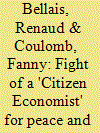

|
|
|
|
|
| Publication |
2008.
|
| Summary/Abstract |
John Maynard Keynes was a citizen economist, anxious to defend a capitalist system threatened by the rise of totalitarianism during the inter-war period. His criticism of the Versailles treaty in 1919 was supported by the idea of a link between economic prosperity and international peace. During the crisis of the 1930s, he advocated using the League of Nations for a peaceful settlement of international conflicts; while being in favour of economic interventionism, he criticised mercantilist policies. He recognised that military expenditure may be used as a reflationary policy, but after 1945 his theory was misused to promote the development of a 'defence-based' economic policy.
|
|
|
|
|
|
|
|
|
|
|
|
|
|
|
|
| 2 |
ID:
084617


|
|
|
|
|
| Publication |
2008.
|
| Summary/Abstract |
During the 19th century, the Utopian economists (as Karl Marx ironically nicknamed them) developed some revolutionary projects of social organisation, breaking away from capitalism. Opposed to political violence, their writings anticipated a peaceful evolution towards a social model similar to socialism. Some of their thoughts still seem relevant today: creation of a federation of States and of an international Parliament; political domination of industrialists and bankers; productive use of the army. This paper presents the thoughts of five French utopian economists who are representative of the school's diversity: Saint-Simon, Fourier, Pecqueur, Chevalier and Proudhon
|
|
|
|
|
|
|
|
|
|
|
|
|
|
|
|
| 3 |
ID:
084612
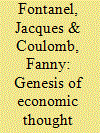

|
|
|
|
|
| Publication |
2008.
|
| Summary/Abstract |
This article links the development of political and philosophical thought with that of economic thought concerning war and peace issues. The economic orthodoxy that emerged during the 17th century presented human relations as peaceful, society being governed by a 'natural order', the Smithian 'invisible hand'. On the other hand, political theory saw emerging a realistic view with human relations characterized by violence, with conflict being society's normal state. This dichotomy explains the relative scarcity of economic studies on war and peace issues and the fact that these have been more often studied by heterodox authors.
|
|
|
|
|
|
|
|
|
|
|
|
|
|
|
|
| 4 |
ID:
084614
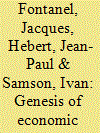

|
|
|
| 5 |
ID:
084618
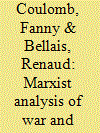

|
|
|
|
|
| Publication |
2008.
|
| Summary/Abstract |
In analysing capitalism, Karl Marx dealt little with issues of international relations and militarism - Friedrich Engels was in charge of these questions. But war has never been integrated in the Marxist diagram. However, Marx and Engels' writings contain essential remarks on international conflicts conceived as a consequence of the class war, on militarism's role in industrial development and on trade wars replacing armed conflicts. These ideas have later been developed by Marxist theorists, notably in pre-revolutionary Russia, with an insistence on the warlike character of capitalism at the stage of imperialism. The Marxist analysis of militarism was continued after the Second World War, accompanied by a controversy on the impact of military expenditure on the profit rate.
|
|
|
|
|
|
|
|
|
|
|
|
|
|
|
|
| 6 |
ID:
084625
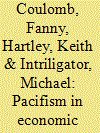

|
|
|
|
|
| Publication |
2008.
|
| Summary/Abstract |
This article presents some pacifist ideas developed in various economists' works since the origins of economic thought. The Classicals considered international peace to be a normal result (as well as a necessary condition) of economic development and human progress. Such a conception is also shared by other schools of thought, such as Utopian socialism or institutionalism. Some economists were active in the development of the pacifist movement before the First World War, which led to the organization of several international Peace Congresses. During the Cold War, certain economic studies on military expenditure and the arms race contributed to the denunciation of an excessive militarism. However, the post-Cold War disarmament highlighted the costs of the necessary peace investment. There is a substantial research agenda and a need for more academic economists to undertake analytical and empirical work in this important field.
|
|
|
|
|
|
|
|
|
|
|
|
|
|
|
|
| 7 |
ID:
084605
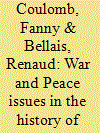

|
|
|
| 8 |
ID:
084609
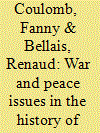

|
|
|
|
|
| Publication |
2008.
|
| Summary/Abstract |
The rising cost of the 'global war on terrorism' is pushing America defence spending to over $600 billion a year, its highest absolute level, and without a large-scale conflict.Simultaneously, many countries, especially in East Asia and Russia, have been increasing their defence budgets since the beginning of the 2000s, ending the global fall in military budgets that had characterised the previous decade in spite of the absence of major international tension.
|
|
|
|
|
|
|
|
|
|
|
|
|
|
|
|
|
|
|
|
|